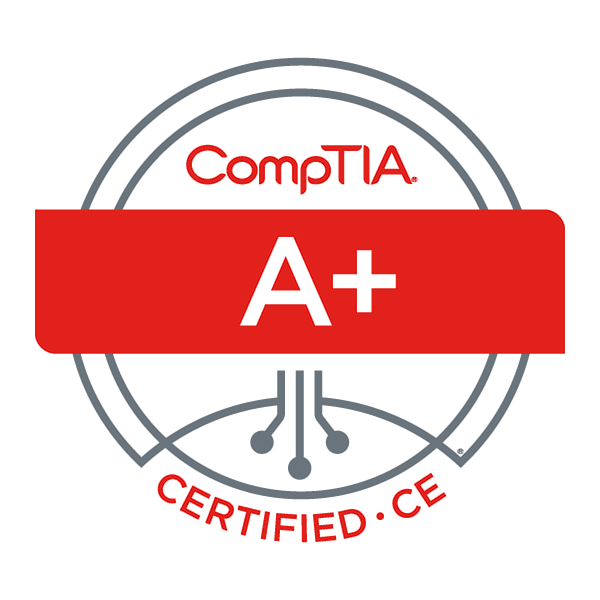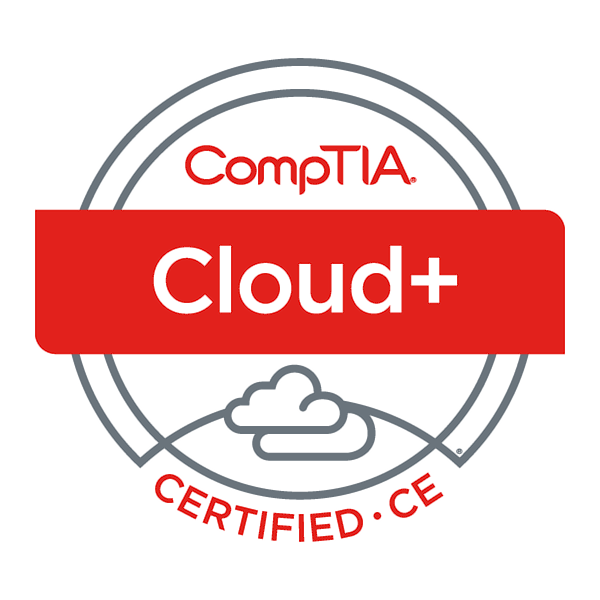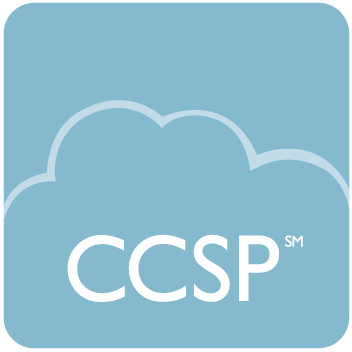What is CompTIA? A+ wasn’t your grade?
CompTIA stands for Computing Technology Industry Association, it is a nonprofit organization that specifically issues certifications for the IT profession. CompTIA offers numerous certifications, including the A+ certification. The A+ certification is typically acquired by those trying to start as IT professionals. It focuses deeply on the core IT skills that are great for entry-level roles, especially help desk and computer repair. Other certifications CompTIA issues include, but are not limited to, the areas of network, security, cloud, hacking, cyber forensics, and project management.
WHY DID I DO IT?
Many many moons ago, I took my first computer science and algebra courses in middle school and have been doing tech as a student or profession every since, except for about a 2 year period in my early 20s. I took a Computer Architecture course that I passed during my senior year of high school. The two main parts of the class:
- We fixed some problematic computers at my high school, typical lab computers that were firewalled to specific internet access.
- We studied for the A+ exam back then
Suffice it to say, I never scheduled the exam. I was interested and ready but I procrastinated and never followed through on it.
Fast forward maybe 15 years, and I have reenrolled in school. The degree program I’m in is for a degree in Network Engineering and Security. One objective for a course I needed to graduate was… *bing bong* get your A+ certification. Honestly, I was happy to see it. Because there are not many things in my life that made me say “what was I thinking”. Not doing the A+ was kind of a goal I once had but didn’t achieve. So cheers to the official death of that dream now, because I have attained an A+ certified status. Enough about me and my reasons, here is some more info about the A+ exam.
A+ requirements
For more information, you can find detailed objectives here for Core 1 220-1101 and Core 2 220-1102. Please note that there are two exams and the objectives are roughly 20 pages each. I must say that CompTIA’s list of exam topics is extremely comprehensive. If you possess a firm grasp of the topics listed below, your probability of success is good.
- Core 1 220-1101
- Mobile Devices
- Networking
- Hardware
- Virtualization and Cloud Computing
- Hardware and Networking Troubleshooting
I must say, I like the way CompTIA has divided these two exams up. I think of Core 1 as the tangibility test. The topics on here involve mostly hardware and troubleshooting hardware. I call it the tangibility test because most topics including the cloud are touched. I kid, but although you likely don’t touch the cloud, someone is touching the cloud. This exam has tons on printer repair, replacing computer and laptop parts, and understanding the components in phones and tablets. This exam also covers virtualization and networking with involves how equipment talks to and touches each other, those are the most intangible objectives in the blueprint.
- Core 2 220-1102
- Operating Systems
- Security
- Software Troubleshooting
- Operational Procedures
Of course, I start by calling Core 2 the intangibility exam. This exam focuses on software and software troubleshooting. I said like the way CompTIA divided the exams up. That is because of two big factors:
- I think this works well for those folks who are new or those who lean heavily in one direction, software or hardware-focused. It gives freedom for people to hone in more on the side they are least proficient in.
- The domains in the Core 1 objectives are really the building blocks for the Core 2 objectives. Simply, hardware and networking are the cornerstones of creating the ability to run software (the operating system is software) and the need to do so securely with operational procedures to support users.
PREPARATION
To prepare for these exams I mainly used Pluralsight and Udemy resources I have access to through my school. WGU also provides vouchers for certification exams, they provide up to 2. After which, exams become an out-of-pocket experience.
Pluralsight and Udemy both offered video training as well as practice exams. I have extensive technical experience including 2 years as a network engineer, over 5 years in network tech/help desk roles, and 2-3 years as a tech installing/repairing cable TV, phone, and internet services. Therefore, my experience alone basically gave me enough hands-on knowledge to pass these exams. Not to mention I studied for the A+ exam in 2004-2005.
I spent roughly 5-7 days for both exams. 2-3 nights for Core 1 watching video content and taking practice exams from the time I clocked out until past midnight. Then from 5:30 AM -8 AM, plus on my lunch breaks. It was a day waiting for my scores to come in, and I requested my voucher and scheduled the Core 2 exam about 3 days later.
EXAM EXPERIENCE
The process for taking CompTIA tests involves going through PearsonVue. PearsonVUE is a company that does proctored computer-based examinations. They began doing online examinations at the onset on the COVID19 pandemic, they do this through a program called OnVue. Scheduling exams through PearsonVue has historically, I’ve done it over a dozen times now, been extremely intuitive, and never had issues. Before the pandemic there were almost always on-site times, now they are sparse to the point of extinction in my area. Therefore, the online route is the only route that doesn’t require scheduling 3-5+ weeks in advance. Prior to the examination, you have to check in by taking pictures of your testing room and your identification and then uploading them.
The first test was flawless, I checked in 13 minutes prior to the scheduled test time. I took the 90-minute exam in roughly 35 minutes and was done with. This link to CertBlaster explains the question types on both exams perfectly well, Certblaster A+ question types
Unfortunately, the second test was an adventure, I was waiting for 30+ minutes after the scheduled time for a proctor, despite checking in 25 minutes beforehand. I get the proctor and had issues, they tell me to restart the app because video stream isn’t working. Keep in mind, I know the issue isn’t my internet connection, I monitor my network. I’m a network engineer. So I restart and it put me in a queue again, even more people in front of me than the first time. I start another chat with support while waiting, they say they’ll escalate me. The escalation turned in another 35-50 minutes. The exam was for 11:30PM, It is now after 1AM. The proctor connects to me, just to say fix your camera. Their stream is still not working. I waited 30 more minutes in chat to get it rescheduled.
I have taken 3 exams with Pearson since, and a dozen before, and I’m inclined to think they had system errors that they would not divulge. Never have I seen them with a queue that long. I rescheduled the exam for the next day during lunch. I checked in 20 minutes early, I spent 30 minutes on the test. I was done maybe 15 minutes after the scheduled time. That’s my A+ exam experience. Typically good, but that first Core 2 attempt was my worse experience with Pearson Onvue. However, I must note, that my experience with Pearson online and in-person is typically great.
On point to note, if you are scheduling A+ or any online test with PearsonVue. Please try to avoid glare with background lights, also the application can really nag about background applications running. If some background processes are running, the exam will not let you proceed with the check-in process. I sometimes disable all startup apps and reboot to avoid having to troubleshoot such issues before a test.
TAKEAWAYS and points
The A+ is an entry-level exam. I totally believe it validates what an A+ (letter grade) tech professional should know. The foundations are all there, and if I was hiring a helpdesk person, A+ certification is basically an automatic qualifier. In today’s job market, the A+ still holds weight and will continue to. If you’re new get it. However, it will work. There are no shortcuts, it takes discipline.
For someone, with at least a third of the experience I have, the A+ exam isn’t worth it. Unless you’re on a cert collection mission or your job asks you to do it, unlikely for above entry-level roles. However, I recommend anyone in IT or even tech-adjacent jobs to learn all the A+ related content, it will help for any role or position.
I hope this was informative. Feel free to reach out to me on social media if you have questions. Thank you for reading.



